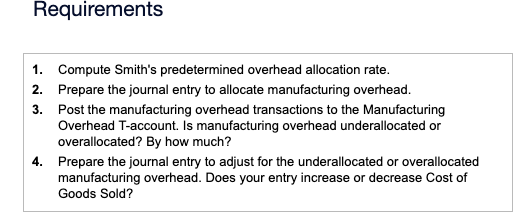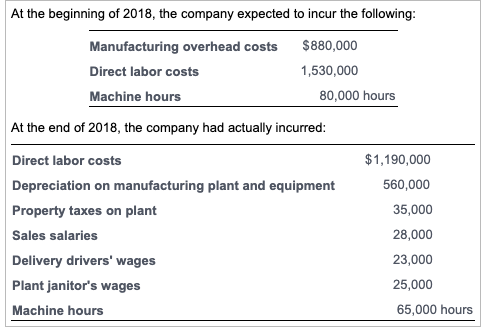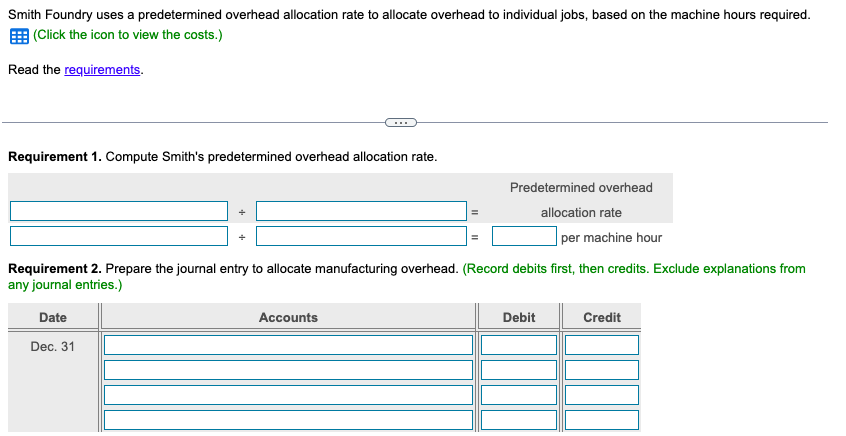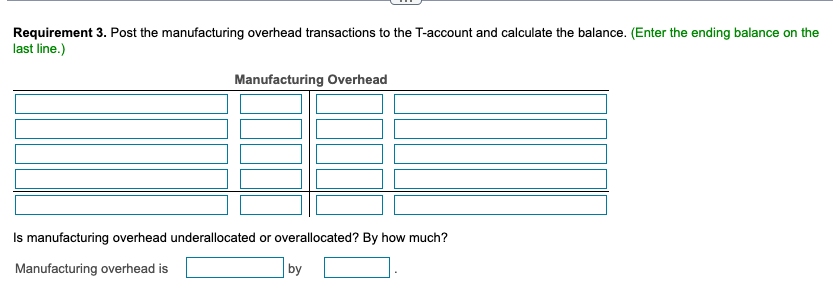Answered step by step
Verified Expert Solution
Question
1 Approved Answer
Requirements 1. Compute Smith's predetermined overhead allocation rate. 3. 2. Prepare the journal entry to allocate manufacturing overhead. Post the manufacturing overhead transactions to





Requirements 1. Compute Smith's predetermined overhead allocation rate. 3. 2. Prepare the journal entry to allocate manufacturing overhead. Post the manufacturing overhead transactions to the Manufacturing Overhead T-account. Is manufacturing overhead underallocated or overallocated? By how much? 4. Prepare the journal entry to adjust for the underallocated or overallocated manufacturing overhead. Does your entry increase or decrease Cost of Goods Sold? At the beginning of 2018, the company expected to incur the following: Manufacturing overhead costs Direct labor costs Machine hours $880,000 1,530,000 80,000 hours At the end of 2018, the company had actually incurred: Direct labor costs Depreciation on manufacturing plant and equipment Property taxes on plant Sales salaries Delivery drivers' wages Plant janitor's wages Machine hours $1,190,000 560,000 35,000 28,000 23,000 25,000 65,000 hours Smith Foundry uses a predetermined overhead allocation rate to allocate overhead to individual jobs, based on the machine hours required. (Click the icon to view the costs.) Read the requirements. Requirement 1. Compute Smith's predetermined overhead allocation rate. = Predetermined overhead allocation rate per machine hour Requirement 2. Prepare the journal entry to allocate manufacturing overhead. (Record debits first, then credits. Exclude explanations from any journal entries.) Date Dec. 31 Accounts Debit Credit Requirement 3. Post the manufacturing overhead transactions to the T-account and calculate the balance. (Enter the ending balance on the last line.) Manufacturing Overhead Is manufacturing overhead underallocated or overallocated? By how much? Manufacturing overhead is by Requirement 4. Prepare the journal entry to adjust for the underallocated or overallocated manufacturing overhead. Does your entry increase or decrease cost of goods sold? (Record debits first, then credits. Exclude explanations from any journal entries.) Date Dec. 31 Accounts Does your entry increase or decrease Cost of Goods Sold? This entry Cost of Goods Sold. Debit Credit
Step by Step Solution
There are 3 Steps involved in it
Step: 1

Get Instant Access to Expert-Tailored Solutions
See step-by-step solutions with expert insights and AI powered tools for academic success
Step: 2

Step: 3

Ace Your Homework with AI
Get the answers you need in no time with our AI-driven, step-by-step assistance
Get Started


